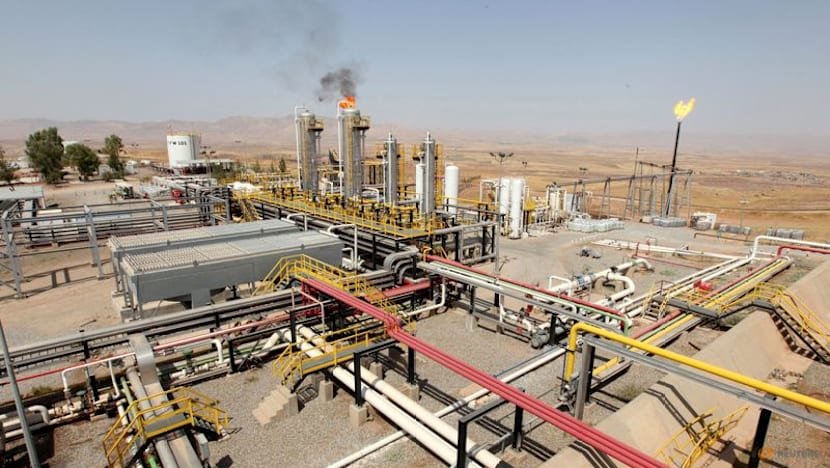Business
Oil Prices Decline as Supply Increases in Global Market

Oil prices experienced a decline of over 1% on Monday, driven by expectations of increased global supply. Plans by the Organization of the Petroleum Exporting Countries and its allies, collectively known as OPEC+, to boost oil output in November, along with the resumption of oil exports from Iraq’s Kurdistan region via Turkey, contributed to a more optimistic supply outlook.
Brent crude futures fell by $1.01, or 1.4%, settling at $69.12 a barrel by 10:19 GMT. Meanwhile, U.S. West Texas Intermediate crude dropped $1.11, or 1.7%, to $64.61. This decrease follows a week of gains, with both benchmarks rising by more than 4% in the previous week.
OPEC+ Plans Increase in Production
OPEC+ is expected to approve another increase in crude oil production during its upcoming meeting on October 1, 2023. Sources indicate that the group is likely to confirm an increase of at least 137,000 barrels per day for November, responding to rising oil prices that have prompted efforts to regain market share. Despite these plans, OPEC+ has been producing nearly 500,000 barrels per day less than its targets, which contradicts market expectations of a supply surplus.
On Saturday, oil exports from the semi-autonomous Kurdistan region of northern Iraq resumed for the first time in two and a half years. The Iraqi oil ministry announced that a new interim agreement between Iraq’s federal government, the Kurdistan Regional Government (KRG), and foreign oil producers will allow between 180,000 and 190,000 barrels per day to flow to Turkey’s Ceyhan port. This resumption could eventually bring up to 230,000 barrels per day back to international markets.
Geopolitical Context Influencing Prices
The recent drop in oil prices follows significant developments in global energy dynamics. Ukrainian drone attacks targeting Russian energy infrastructure last week impacted fuel exports from Russia, leading to increased volatility in oil markets. Analysts from SEB noted, “Ukraine naturally smells blood here… If anything, Ukraine will likely double up on its strategic attacks on Russian refineries.”
In a related geopolitical context, Russia launched a series of airstrikes against Kyiv and other Ukrainian cities early on Sunday, marking one of the most sustained assaults on the capital since the beginning of the conflict in 2022. Additionally, the United Nations has reinstated an arms embargo and imposed further sanctions on Iran concerning its nuclear program, with Tehran warning of severe repercussions.
The interplay of increased supply and geopolitical tensions continues to shape the landscape of global oil prices, making future movements in the market highly anticipated by analysts and stakeholders alike.
-

 Lifestyle4 months ago
Lifestyle4 months agoHumanism Camp Engages 250 Youths in Summer Fest 2025
-

 Business5 months ago
Business5 months agoKenvue Dismisses CEO Thibaut Mongon as Strategic Review Advances
-

 Sports4 months ago
Sports4 months agoDe Minaur Triumphs at Washington Open After Thrilling Comeback
-

 Sports5 months ago
Sports5 months agoTupou and Daugunu Join First Nations Squad for Lions Clash
-

 Top Stories5 months ago
Top Stories5 months agoColombian Senator Miguel Uribe Shows Signs of Recovery After Attack
-

 World5 months ago
World5 months agoASEAN Gears Up for Historic Joint Meeting of Foreign and Economic Ministers
-

 Health4 months ago
Health4 months agoNew Study Challenges Assumptions About Aging and Inflammation
-

 Business5 months ago
Business5 months agoOil Prices Surge Following New EU Sanctions on Russia
-

 Entertainment4 months ago
Entertainment4 months agoDetaşe-Sabah Violin Ensemble Captivates at Gabala Music Festival
-

 Entertainment4 months ago
Entertainment4 months agoBaku Metro Extends Hours for Justin Timberlake Concert
-

 Top Stories5 months ago
Top Stories5 months agoRethinking Singapore’s F&B Regulations Amid Business Closures
-

 Business5 months ago
Business5 months agoU.S. House Approves Stablecoin Bill, Sends to Trump for Signature









